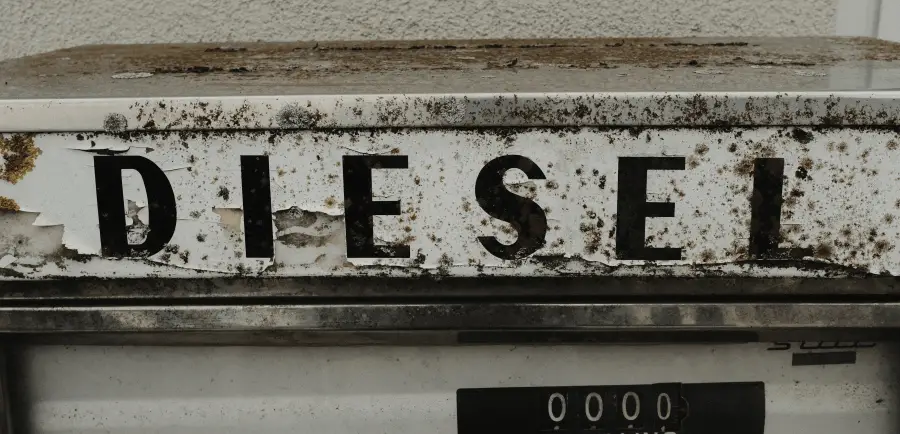When it comes to lawn mowers with combustion engines, gasoline is by far the most popular choice. This is especially true for private use machines, which use straight gasoline or the classic gasoline-oil mix. But what about diesel?
Lawn mowers that are designed with diesel engines not only can, but must use diesel fuel. The opposite is true for mowers using other common type of combustion engines. Unleaded gas and even gas and oil mixtures are required for them. Diesel should never be used in a non-diesel engine.
Today we will be showing some much-needed love to diesel and the lawnmowers that use it. We discuss the fuel’s characteristics, its perks, as well as its drawbacks when compared to other forms of fuel. We will also pinpoint some of the best diesel lawnmowers on the market today.

Contents
Are There Diesel Lawn Mowers?
Believe it or not, diesel lawn mowers are a thing!
The main reasons you don’t bump into them every day are cost and purpose of use.
Diesel engines are mostly reserved for commercial lawn mowers that are used for large-scale jobs like maintaining golf courses, airfields, and public parks. Chances are the lawn mowers in your neighborhood use gasoline or electricity.
Diesel Mower Characteristics
- Diesel-powered mowers are also considerably more expensive than their gas-powered equivalents.
- Diesel engines are much more complex than gas engines, and they typically have a longer lifespan. It is not unheard of for diesel mowers to be 15-20% more expensive than equivalent gasoline variants.
- There is also the fact that the long-term costs of running a diesel motor are much lower than those of a gasoline engine with similar output. Diesel fuel packs a bigger wallop than an equivalent volume of gasoline, which means you can cover more ground.
This level of efficiency makes diesel mowers better for the big jobs we mentioned earlier. Golf courses and parks are likely to have sections with tough wild grasses that require a mower with endurance.
Gasoline Vs Diesel Lawn Mowers
Gasoline mowers simply cannot compete in such an arena. If you have plans of starting a commercial landscaping business, just know that gas mowers will need a LOT more re-fueling than diesel mowers. The fuel costs of a gas mower can easily catch up to the relatively low purchase price if you are going to be mowing frequently.
Did we also mention service costs? You have to consider those too. Diesel engines, on average, do not require as much service as gas motors, which is something worth noting. Diesel fuel burns cleanly and does not do much harm to the motor.
Contrastingly, some gasoline variants (especially ethanol blends) have negative effects on a motor’s longevity. Ethanol, in particular, can release water into the engine, which can cause rust.
Ultimately, the high purchase cost (and often bulky builds) of a diesel mower are not always practical for a typical suburban yard. Also, homeowners do not mow their lawns every day so there’s less need to worry about long-term fuel costs.
If you want to learn more about mowers, I suggest reading some of my other articles…
- Lawn Mower Blown Head Gasket?
- How To Tell If A Lawn Mower Is 2-Stroke Or 4-Stroke
- How Do I Make My Lawn Mower Blade Spin Faster?
What Fuel Should I Use In My Lawn Mower?
You should only use the fuel specified for the lawnmower. Never assume when it comes to this because you run the risk of destroying the mower’s engine. Even worse, any existing warranties will be voided. Manufacturers are notoriously unforgiving when it comes to this issue.
With regards to combustion engines, you have:
- Gasoline lawnmowers
- Gas-oil mix lawnmowers
- Diesel lawnmowers
- Propane lawnmowers
The first two are commonly used for domestic lawn mowers while the latter two are mostly used by commercial landscaping outfits.
Can I Use Gasoline Or Diesel From A Gas Station In A Lawn Mower?
In all of these mowers, where do you get the fuel? Do you have to go somewhere special or can you just go to a nearby station?
Gas from a gas station is perfect for use in most all lawn mowers. This is true for 4-stroke engines using pure gasoline, 2-stroke engines using a mix of gasoline and oil, as well as diesel mowers. Many lawn crews pull their trailers full of mowers right up to the pumps for daily fill-ups.
There is no need to buy gas and store it up or get it from a special ‘lawn mower only’ retailer. Though there are tips and even regulations on how to get it from a standard stations.
Some of these are:
- Filling non-approved containers at the pump is prohibited.
- Use dedicated gas containers designed and certified for gasoline storage.
- Filling directly into mowers is acceptable.
- Filling directly into smaller combustion engine equipment is not advised (leaf and snow blowers, weed eaters, etc.)
- You are responsible for paying for fuel spilled and covering mower engines in gas can start fires.
Proper Storage Of Gas From A Gas Station
Storing gas in proper containers is very important. I also recommend using different sizes and colors for the different types of gas, mixed gas, and diesel fuels. This saves much time and effort fixing mistakes and large repair bills when the wrong fuel types are run in a mower.
To keep track of the different fuel types in safe containers I recommend these gas cans from Amazon. For less used mixed gas storage, this is the can we always use. For regular or diesel fuels used more often, a larger can like this one from Amazon is best. Using cans of different sizes have saved us from filling tanks with the wrong fuel many times.
Gasoline Or Diesel For 4-Stroke Mowers?
Straight gasoline is used to power gasoline mowers with 4-stroke mowers. There is no need to mix oil with the fuel because oil is added separately to a reservoir. It is important not only to keep oil topped off in these engines, but to change the oil regularly.
These mowers can use pure gasoline (regular, midgrade, or premium) or an ethanol blend (E10, E15). Try to avoid using E15, though as it has an even higher ethanol content, which will accelerate the problems mentioned earlier.
Gasoline Or Diesel For 2-Stroke Mowers?
A mixture of gas and oil (or “mixed fuel”) is used in 2-stroke lawnmowers because they do not have designated oil reservoirs. Mixing oil with gasoline is the most efficient way to deliver lubrication to the pistons, which only require two strokes to complete a combustion cycle.
The type that we have used for years is the Echo brand of mixing oil. It comes in one gallon ready to mix bottles and contains fuel stabilizer. You can get them here on Amazon.
Gasoline Or Diesel For Diesel Engines?
Diesel fuel is used to power lawn mowers with diesel engines. As we’ve already seen, diesel has a greater output (per unit volume) than gasoline, making it much more fuel-efficient.
Diesel also releases lower CO2 emissions than most gasoline variants. The emergence of bio-diesel means owners don’t have to worry about increasingly strict environmental laws.
Propane For Mowers?
Propane is another fuel source some companies and commercial landscaping businesses are turning to. The rising cost of gasoline is bad news for profit margins, especially for small operations.
Propane is cheaper than gasoline and can be stored for far longer. Gasoline must be used before it goes bad (typically between 12-18 months), while propane can be stored for years. Propane is also much cleaner and less harmful to the environment.
How Do You Drain Gas From A Lawn Mower?
Let’s say you filled up your mower from a can you thought was the right type of fuel. Then you realize it wasn’t. What do you do now?
Emptying Larger Mowers Of Fuel
There are two approaches to drain gas from your large mower. Before you begin either method, ensure the mower is off. If the mower had been running recently, make sure to give it enough time to cool down.
Removing Gas With A Siphoning Pump
The first (and easiest) method is to use a siphoning pump. There are manual and mechanical pumps, and both types are available on Amazon.
Stick one end of the siphoning pump into the lawnmower’s fuel tank and place the other into a fuel canister. Consult the siphoning pump’s manual to know which side is which. Ensure the end in the tank is completely submerged in fuel.
Next, activate the pumping mechanism to create a suction vacuum that will pull the fuel from the tank and into the canister. You may have to tilt the mower a little to keep the siphoning end submerged.
Manuel Siphoning Of Gas From A Mower
The other way to drain a mower fuel tank is to use two hoses, a wet rag, and gravity.
One of the hoses should be long enough to reach the bottom of the tank and feed into a waiting canister. The other hose must be short. Just enough to stick out of the fuel cap opening without getting submerged in fuel. Ensure the mower’s tank is positioned higher than the collection canister.
With the two hoses in position, place the wet rag over the rest of the fuel cap opening to seal it. The two hoses must be the fuel tank’s only air outlets/inlets.
Next, while making sure the long hose is placed inside the collecting canister, blow into the short hose. If the opening is securely sealed, pressure will build in the fuel tank and force fuel up the long tube and into the canister.
Once the fuel starts flowing, you can stop blowing. At this point, a suction vacuum is formed, which will pull fuel just like a siphoning pump.
With either method, it is impossible to empty the fuel tank. You will have to run the lawnmower to use up any remaining fuel.
Emptying Smaller Lawn Mowers Of Gas
This next method comes from years of experience. There is rarely a manufacturer that will suggest this and many that may like to pass judgement in forums, but I and others I know have done this with no problems hundreds of times.
With smaller, lighter push mowers that have been filled with mixed gas or diesel mistakenly, we simply turned the mower over and emptied the tank into a large mouthed container. We would then transfer the fuel to a proper gas can afterward.
Care needs to be used on which way to tip the mower. You don’t want gas in your air filter. This will take a lot of time to clean out and can cause a fire if not done properly. Simply look at the placement of the air filter and tilt the mower the other direction.
Be warned, this is a fast, but potentially messy solution. The better options will undoubtably be using one of the siphoning methods above even on smaller mowers and combustion engine equipment.
Diesel Lawn Mowers

As we have seen, diesel has many good things going for it. Now, it’s time to look at some of the best lawnmowers running on this awesome fuel.
The Z994r
First up we have a zero-turn mower that is almost peerless. The Z994r “ZTrak” from John Deere is arguably the best zero-turn ever made. The list of features is almost endless. You have a user-friendly dashboard and instruments, a time-saving rear discharge mowing deck with blades that can reach speeds of 16,000 feet per minute.
However, the standout feature is the 3-cylinder diesel (or bio-diesel) engine that produces 25 horsepower. John Deere made history back in the 1980s by being the first manufacturer to produce diesel lawn tractors. The company has remained on that innovative path by being one of the first brands to make machines that can run on bio-diesel.
The Z994r is best in class when it comes to carbon emissions, yet there is no compromise in performance. The Deere certainly knows how to deliver, and this lawnmower is yet another classic from one of the best in the business.
The Toro 7500-D
Another noteworthy diesel lawnmower is the Toro 7500-D Series 60-inch. Yet another superb zero-turn from a legendary manufacturer. This commercial mower is hands down the best way to maintain a golf course, just ask the PGA!
The 7500-D 60-inch is powered by a glorious Yanmar diesel engine. The 1642cc motor boasts 37 horsepower and powers the mower’s three blades to a ridiculous 18,200 feet per minute!
Yes, I said ridiculous. Insane would be another appropriate word.
I could rattle on about statistics and performance data, but the truth is that this is an indescribable machine. The only way to get to know the 7500-D is to experience it.
Other notable diesel mowers include:
- John Deere X750 Lawn Tractor
- Kubota ZD1500 Zero Turn
- Exmark Laser Z
- Hustler Super Z
The Final Touches On Using Diesel In Lawn Mowers…
One way to look at the question of whether you can put diesel into a lawn mower or not is the fact that most mowers you will come in contact with will not have diesel engines. Therefore in most instances diesel will not be used.
The other way to look at it is the effectiveness of diesel engines and mowers. In these machines, diesel is used and performance is actually better in most circumstances.
So, no diesel is not used in gas powered mowers, but it is used in diesel engine mowers.
Hopefully this deep dive into mowers and their fuels has helped you. If you would like to read more about lawn care and mowers, see these articles…
- Lawn Mower Blown Head Gasket?
- How To Tell If A Lawn Mower Is 2-Stroke Or 4-Stroke
- How Do I Make My Lawn Mower Blade Spin Faster?
References
https://homeguides.sfgate.com/diesel-lawn-mowers-vs-gas-lawn-mowers-74564.html
